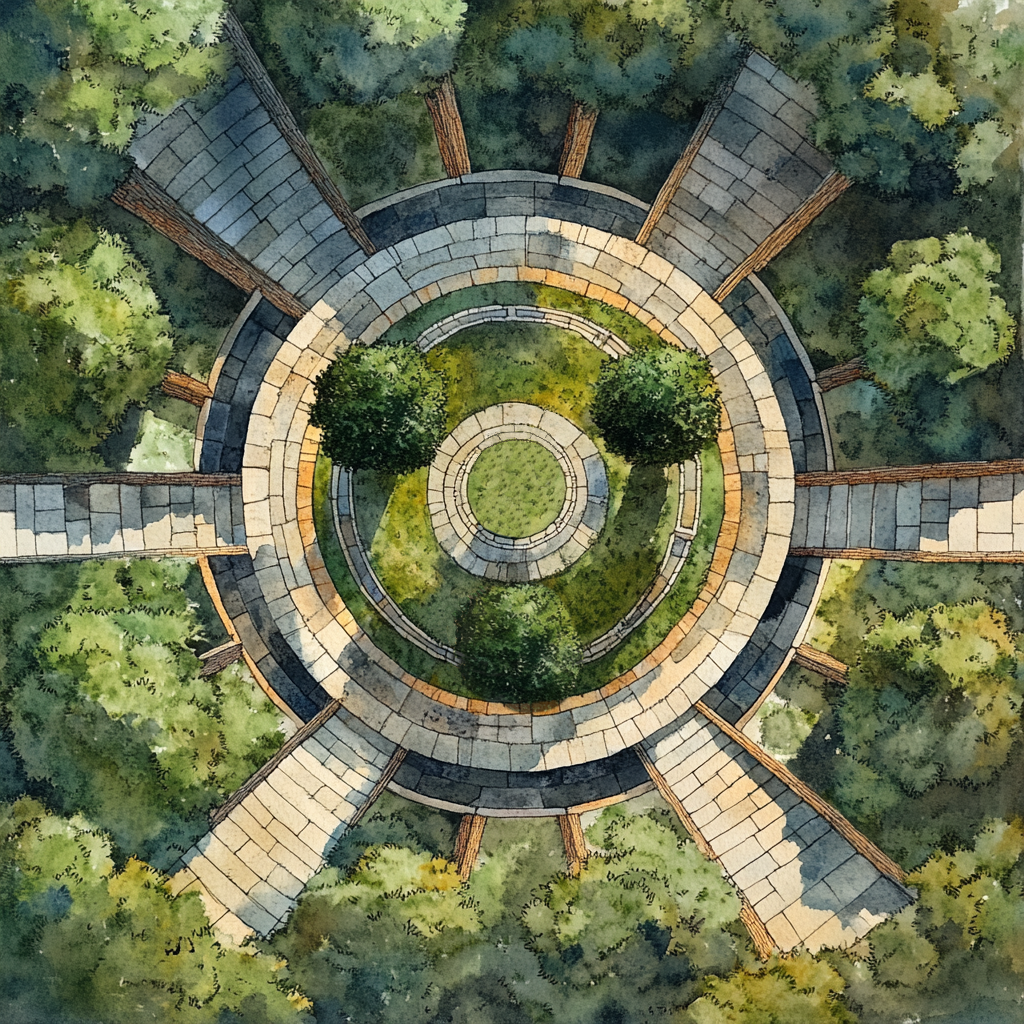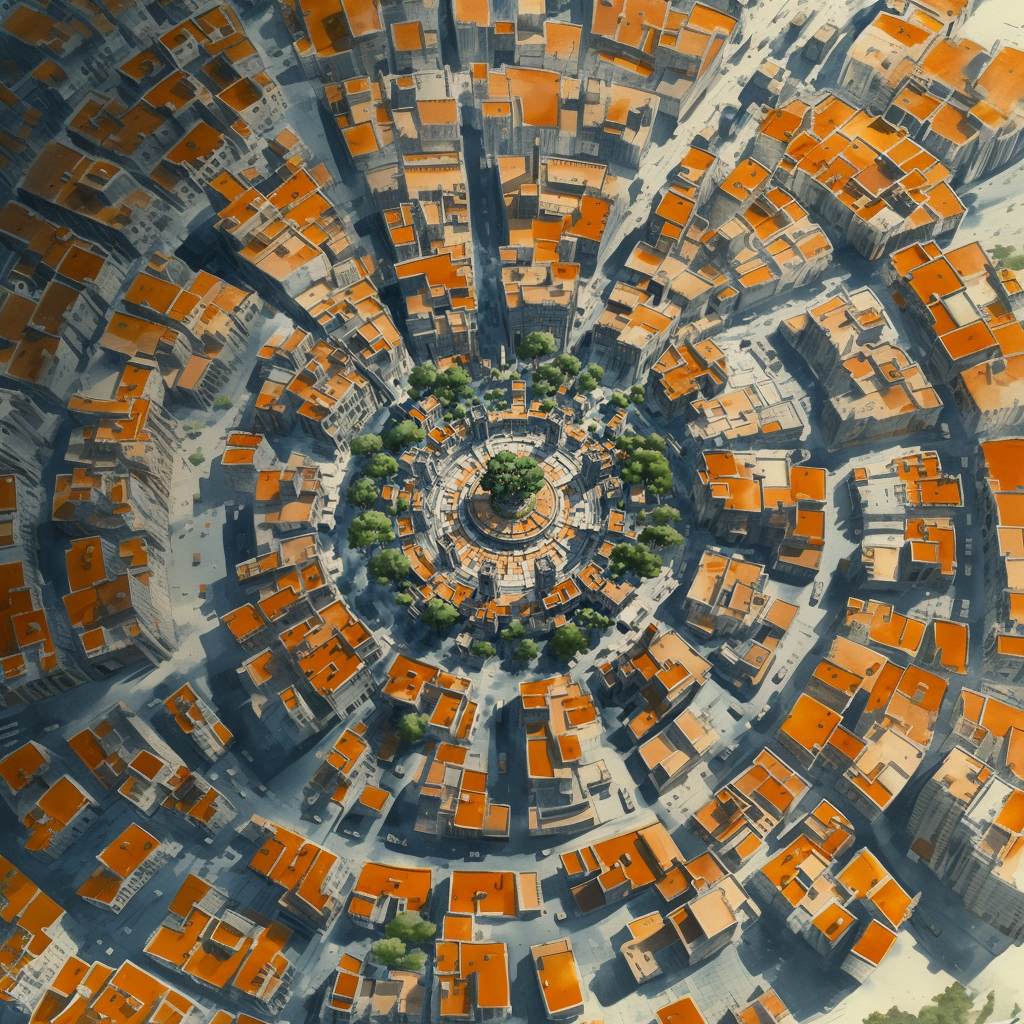Delon-Estin-Ótí
Location: Mechanus

Guvner Eirene Thalassa Kyrios recorded this entry following her recent journey to this curious burg:
My pilgrimage to Delon-Estin-Ótí was driven by a sacred duty more than any desire to come to terms with my own future. We scholars of Athena pursue wisdom for the glory of knowledge itself, as well as to understand how the tides of battle might turn. But my journey here was more subtle. Following a particularly obtuse and frankly unhelpful prophecy from the Oracle at Delphi, I received a dream-vision—I assume from Athena Pallas herself—of a burg with twenty concentric walls.
Now I’m no planar geographer but it doesn’t take a genius to realise this could only mean Delon-Estin-Ótí, that strange town of Mechanus where the inhabitants are said to be so in tune with the music of the spheres that they’re able to not just predict but see the future. Perhaps, I surmised, Athena was nudging me in this unusual direction. Apollo’s visions from Delphi have been somewhat lacking of late, and perhaps a little recalibration is required.
So this is why I found myself in a clockwork air balloon drifting between the—frankly concerningly—sharp cog-wheels of Mechanus in search of Delon-Estin-Ótí, that perfect snowflake forged from law and order. Had I foreseen the airsickness I would have paid the extra to that pushy moigno to plot a direct course through the Labyrinthine Portal. But we live, learn, and hopefully land in one piece.
As we descended, ushered in to a space that had been conveniently cleared for us in the burg’s marketplace—we were clearly expected—I caught a glimpse of the burg from above, a vast spiderweb of a town, if spiders used rulers and set squares. Perfectly aligned roads radiated out from a central hub, like an Olympian agora, only planned properly and with fewer arguments. The twenty walls that bordered the town were immaculate, without a single brick mismatched or out of place, each wall housing two gates on opposite sides of the burg. The gates, I learned later, were always guarded, not by an official watch per se, but more by the weight of expectation.
Once away from the rhythmical whirr of the clockwork balloon’s rotors, I was confronted by a serenity so deep it was almost unsettling. As if quietness can creep up on you like a tiger and pounce! The silence here is not like the silence of an empty library, but rather the silence of anticipation, the quiet before a string of words that have already been formed in the mind but not yet spoken. The citizens of Delon-Estin-Ótí moved with purpose, their actions so habitual that they seemed to know not only what they were doing, but what I was about to do as well. They were almost all completely mute.
The roads were lined with agricultural plots, where fruits and vegetables grew in perfect rows, and animals were tended with care so meticulous it bordered on religious. Everything they say about this burg is true; it was indeed a place of peace and predictability, where every minute detail seems part of a well-rehearsed pattern. Chant goes that the citizens of Delon-Estin-Ótí can anticipate the course of time and conversation, and this I found to be no exaggeration. Conversations between cutters here ended before they even began, with a single raised eyebrow, a single intake of breath or a profound sigh communicating more than words ever could.
The Web of Fate

My pilgrimage however, led me to the centre—a great open space, covered with grass and encircled by a single ring of trees. At the very heart of this space stood three trees, their roots intertwined in a bare patch of earth. It was here, beneath these trees, that the townsfolk gathered for their quiet meetings, their discussions as much a part of the town’s rhythm as the turning of the gears beneath.
Despite the town’s simplicity, there was an undercurrent of something deeper, something inherent and unspoken. The people here are experts at interpreting patterns, and many who seek to know their fate come to Delon-Estin-Ótí for this very reason. The locals do not think of the future in grand terms or elaborate predictions. Instead, they see the future as a series of probabilities—a delicate web of cause and effect. For those attuned to the law, like myself, the citizens are said to be able to predict the course of events with uncanny accuracy. But for chaotic sods, the future here is as impenetrable as the town’s twenty walls.
The Oracle and the Question Unasked
I had come to Delon-Estin-Ótí to consult the Oracle, seeking insight into a question that had gnawed at the edges of my mind. Yet, to my surprise, the Oracle here was not a singular figure, but rather the town itself—a collective consciousness that seemed to know what I was seeking before I even knew how to ask. My guide, a woman named Jarua Britin, was one of the few in town who still spoke in the old way, her voice carrying the weight of one who understood the burden of communication.
When I finally stood before the Oracle, or rather, before the gathering of citizens who embodied it, I found myself at a loss. I had prepared my question, meticulously crafting it to elicit the most precise answer. But before I could speak, the answer came—not in words, but in a feeling, a subtle shift in the air that told me what I needed to know. It was as if the town itself had anticipated my query and offered the answer before the question had fully formed on my lips.
Departure and Reflection
As I prepared to leave, I couldn’t help but feel a deep sense of unease. The citizens, so attuned to the flow of time, seemed almost to pity me as they looked to the skies. There was something unspoken, a shadow on the horizon that only they could see. It was a reminder that even in a place as ordered as Delon-Estin-Ótí, there are unknown mysteries that defy even the most rigorous of minds.
As I left the town behind, I carried with me the weight of the Oracle’s answer, a burden of knowledge that was both a gift and a curse. Athena teaches that wisdom is the greatest of all virtues, but wisdom also carries with it the responsibility to act. What I had learned in Delon-Estin-Ótí will surely shape my path in the days to come, a thread in a metaphorical blindfold which hided my eyes from the multiverse, that I have yet to fully unravel.
Canonical Sources: Manual of the Planes [3e] p129-130; Planes of Law [2e] Mechanus p16-18 (full description)
Source: Jon Winter-Holt


